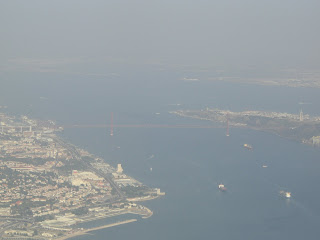When I stepped into a bus for my first time here in the Lisbon area, I saw the sign "Ar Condicionado", (i.e., air conditioned) written on the bus. It was obvious since all the windows of the bus were closed and passengers inside seemed comfortable. But I quickly realized that there might be non-air-conditioned buses. And, my inference was correct. So far I rode such buses twice. In the near future, signs of "strongly air conditioned" and "weakly air conditioned" might appear like in Japan.
Yesterday when I walked on a sidewalk near the office, I felt a liquid drop on my head. As I quickly thought I got bird s??t to look out to the sky, I noticed that water kept dropping off from an air conditioner placed outside of the building probably on its 3rd or 4th floor. I wondered if no one knew it was leaking water. Then, I found that air conditioners of the buildings I checked didn't have a hose to pump out water to a gutter (Picture 1). To believe or not, sidewalks were wet here and there because of free water drops from air conditioners (Picture 2). Today, on our way to lunch, Rui, one of Miguel's company colleagues got a water drop on his head. Okay, let's be aware of water drops from now on.
リスボンに来て初めてバスに乗ったとき、車体に冷房中と書かれているのに気がつきました。バスの窓は全部閉まっているし、乗客もみな心地よさそうにしているので、そんなの分かりきっているはずです。しかし、直ぐに、ひょっとして冷房車ではないバスもあるのかもと気付きました。そうです、その推測は当たっていました。これまでに2回ほどそういうバスに乗りました。そのうち、日本のように、強冷房、弱冷房なんて表記が出てくるのかもね。
昨日オフィスの近くの歩道を歩いていたとき、頭に冷たい物を感じました。鳥の糞かと空を見上げたら、ビルの多分3階か4階に取り付けてあるエアコンから水滴がしたたり落ちているのに気付きました。誰も水漏れに気付いていないのかと不思議に思ったのですが、どのビルもエアコンに水よけのホースが着装されていません (写真1)。信じようが信じまいが、歩道はあちこちでエアコンからしたたり落ちる水で濡れています(写真2)。今日、昼飯を食べに行く途中、ミゲールの同僚のルイという人も、水滴を頭にうけました。よくわかった、これからは気をつけないとね。
Picture 1. Air conditioners placed outside of builds

Picture 2. Sidewalks wet with water drops from air conditioners.












